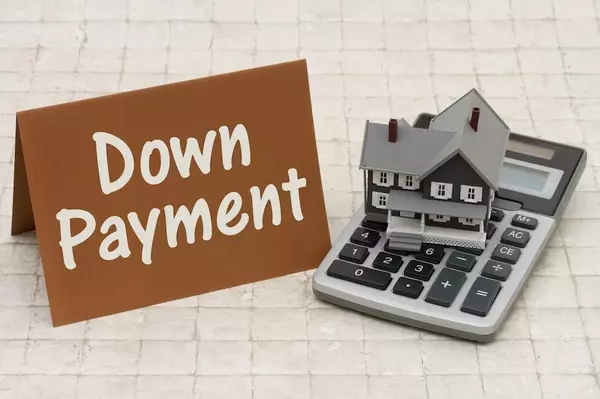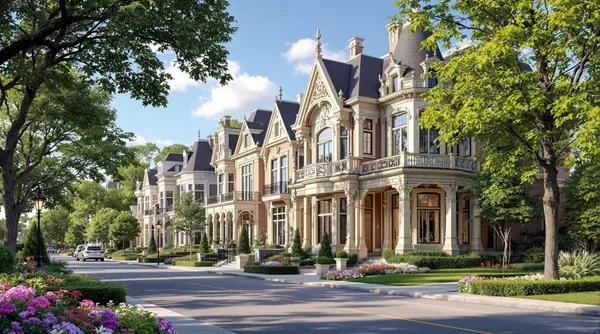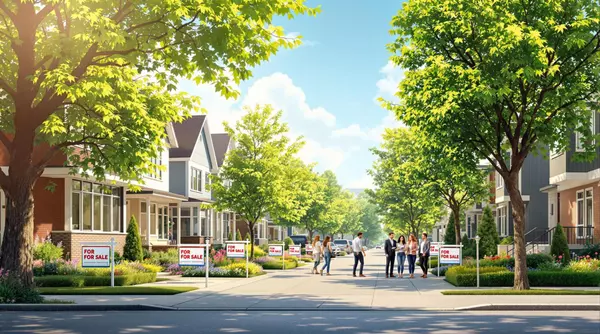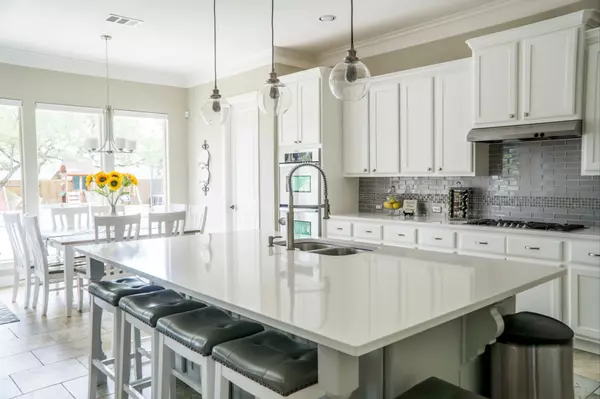7 Essential Steps for First-Time Home Buyers in Ottawa

Buying your first home in Ottawa? Start here. With average home prices reaching $670,000 and condos at $441,000 in 2025, Ottawa offers diverse options for first-time buyers. Whether you're eyeing a condo in Centretown or a family home in Barrhaven, this guide breaks down every step - from budgeting to closing.
Key Highlights:
-
Programs for Buyers: Access benefits like the First-Time Home Buyer Incentive, RRSP withdrawals, and up to $4,000 in land transfer tax rebates.
-
Neighbourhood Insights: Explore areas like Orleans for bilingual families or Riverside South for budget options.
-
Market Trends: Detached homes are up 8.4% in price, while condos have a buyer-friendly inventory of 7.3 months.
-
Costs to Plan For: Beyond the purchase price, budget for inspections ($500-$800), legal fees ($1,500-$2,500), and maintenance.
Quick Tip: Stick to the 28/36 rule for your budget - keep mortgage payments under 28% of your income and total debts below 36%. Ready to dive in? Let’s walk you through the process step by step.
Buying a Home in Ottawa in 2025! (Buyers Guide)
Step 1: Check Your Finances
Before diving into Ottawa's real estate market, take a close look at your financial situation.
Ottawa Home Price Guide
Home prices in Ottawa vary widely depending on the neighbourhood and property type:
| Property Type | Average Price | Market Notes |
|---|---|---|
| Detached Homes | $821,202 | Up 8.4%; Popular in Barrhaven ($650k+) |
| Townhomes | $555,873 | Up 0.9%; High demand in Kanata, Orleans |
| Condos | $441,704 | Up 5.4%; Centretown condos at $550k |
Additional Costs to Consider
Buying a home involves more than just the purchase price. Be sure to factor in these additional expenses:
| Cost Type | Typical Range | Notes |
|---|---|---|
| Home Inspection | $500-$800 | Especially important for older homes |
| Legal Fees | $1,500-$2,500 | Covers standard closing costs |
| Title Insurance | $300-$600 | A one-time payment |
| Moving Costs | $1,000-$5,000 | Depends on moving distance |
| Development Levies | $5,000-$20,000 | Applies to new construction only |
Set Your Home Budget
Stick to the 28/36 rule: keep mortgage payments at or below 28% of your gross income, and total debts under 36% [1][5].
For example, using Ottawa's average condo price of $441,704, you can estimate your maximum affordable price with this formula:
Max Price = (Annual Income × 4) + Down Payment - Debts
Here are a few financial factors to keep in mind:
-
Emergency Fund: Set aside $8,000-$16,000 (equal to 3-6 months of mortgage payments for a $500,000 mortgage). For older homes, especially in Ottawa's harsh winters, consider increasing this amount to cover unexpected repairs like furnace issues [3].
-
Maintenance Costs: Plan to spend 1-3% of your home's value annually on upkeep. For condos, expect monthly fees averaging $0.60 per square foot [6].
Once you've got a clear budget, your next step is securing mortgage pre-approval.
Step 2: Get Pre-Approved for a Mortgage
Once you've set your budget, the next step is securing a mortgage pre-approval, which can give you an edge in Ottawa's competitive market.
Choose Your Mortgage Lender
The lender you pick can influence both your borrowing capacity and the rates you qualify for. Here's a quick comparison of common lender types in Ottawa:
| Lender Type | Ottawa-Specific Perks |
|---|---|
| Big Banks (RBC, TD) | Easy branch access and bundled services, ideal for first-time buyers who prefer in-person support |
| Credit Unions (Alterna) | Flexible qualifications and lower rates, often a good fit for self-employed individuals or public servants |
| Monoline Lenders (MCAP) | Competitive rates and lower penalties, great for buyers focused on minimizing costs |
To get pre-approved, you'll need these documents:
-
Two years’ worth of pay stubs or T4 slips
-
Two Notices of Assessment
-
Proof of down payment (90-day history)
-
Valid ID
Current Rates and Terms
As of February 2025, mortgage rates in Ottawa reflect recent adjustments by the Bank of Canada. Here's a snapshot of the latest rates:
| Term Type | Rate Range | Special Offers |
|---|---|---|
| 3-Year Fixed | 4.89% - 5.15% | Rates tailored for first-time buyers |
| 5-Year Fixed | 5.02% - 5.34% | BMO offers an additional 0.30% discount |
| Variable | Prime - 0.50% (6.20%) | Includes a 120-day rate hold option |
Key Pre-Approval Points to Keep in Mind
The B-20 stress test can significantly lower your maximum approval amount. For instance, someone earning $100,000 might see their approval drop from $500,000 to $400,000 [5]. This is especially relevant for buyers eyeing condos in Centretown.
There are also Ottawa-specific programs to explore, such as Meridian's plans for newcomers and CMLS's family equity partnerships.
"Ottawa-based credit unions often approve higher amounts for public servants with pension plans", says a local mortgage specialist [5].
Finally, compare at least three lenders, as rate differences in Ottawa can exceed 0.75% [5]. Once you're pre-approved, you'll be ready to focus on neighbourhoods that fit your budget and lifestyle.
If you are looking to get professional advice, book a call with our preferred lender at Mortgage Alliance - Rajnish Sharma.
Step 3: Pick Your Ottawa Neighbourhood
Finding the right neighbourhood is a key step in buying your first home. Ottawa offers a wide range of communities, each catering to different lifestyles and budgets.
Ottawa Area Overview
Ottawa's neighbourhoods differ in character and pricing. Here's a closer look at some popular areas:
| Neighbourhood | Average Price (2025) | Key Features | Best For |
|---|---|---|---|
| Riverside South | $620K (houses) | New developments, future transit plans | Budget-conscious buyers |
| Barrhaven | $670K (houses) | Top-rated schools (St. Joseph HS), low rental vacancies | Growing families |
| Orleans | $650K (houses) | Bilingual programs, access to Petrie Island | Bilingual families |
Emerging areas are also worth exploring. For example, the Claridge Icon area in Little Italy has seen a 19% increase in property values over the past year, thanks to its proximity to the LRT. Homes near transit hubs generally command 12-18% higher prices [2][4].
For remote workers, Almonte, located 35 km west of Ottawa, offers affordable homes, fiber internet, and a quieter lifestyle. Additionally, the upcoming Tewin Development could be a strong long-term investment [6].
Assess Natural Risks
Environmental factors can influence both property value and insurance costs. Use these tools to evaluate potential risks:
| Tool | Purpose | Key Information |
|---|---|---|
| Ottawa River Floodplain Map | Assess flood risks | GIS mapping for flood-prone areas |
| GeoOttawa | Analyze soil stability | Access historical data |
| City Development Map | Evaluate future projects | Check zoning changes |
Different areas come with specific environmental considerations:
-
Urban Core: Centretown experiences a heat island effect, with temperatures averaging 3°C higher than surrounding areas.
-
Rural Properties: Homes with well and septic systems require extra upkeep, costing about $3,000 every five years [5][7].
"What infrastructure projects are approved nearby?" This is a critical question to ask when evaluating a neighbourhood [3][7].
Utility costs also vary by area: downtown condos average $120-180/month, Kanata hydro bills are around $210, and Orléans winter gas costs about $150 [5][7].
Recent zoning updates (Bill 109) now allow fourplex conversions in neighbourhoods like Hintonburg. Use GeoOttawa to confirm zoning permissions before making any decisions [2][4].
After narrowing down your preferred neighbourhoods, connect with a local real estate agent for more in-depth advice – that's the next step.
sbb-itb-694b442
Step 4: Find a Real Estate Agent
Once you've narrowed down your ideal neighbourhoods, the next step is teaming up with a real estate agent who knows those areas inside and out. A skilled agent can help you navigate the market and secure the right home, even in competitive conditions.
What to Look For in an Agent
When choosing an agent, prioritize those with a strong track record of assisting first-time buyers in Ottawa. Here are some key qualifications to consider:
| Qualification | Why It Matters |
|---|---|
| Ottawa-Specific Expertise | Familiarity with bilingual needs, flood zones, and local market trends |
| Transaction History | High repeat client rate (70% or more) [5], which indicates client satisfaction |
| Builder Connections | Can provide access to pre-construction opportunities [3] |
When interviewing agents, ask direct questions like:
"How many first-time buyers in my price range did you assist last quarter?" [1][3].
Before committing, always verify their credentials. Check for:
-
OREA certification
-
Access to the local MLS
-
References from recent clients
-
Experience in your preferred neighbourhoods
Understanding Buyer Agency Agreements
In Ottawa, buyer agency agreements are standard practice. These agreements, which typically last 90-120 days, outline your agent's responsibilities and set commission rates, usually between 2-2.5% [3][5]. They are legally binding and ensure your agent acts in your best interest under Ontario law.
Key components to review in the agreement:
| Agreement Terms | Details |
|---|---|
| Duration | Usually 90-120 days, with an optional 30-day trial period |
| Commission | 2-2.5%, with possible performance-based adjustments |
| Service Standards | Includes guarantees like response times |
| Termination Rights | Allows for exit clauses based on performance |
Tip: Agents are required by RECO to explain all terms both verbally and in writing before you sign [3].
Red Flags to Watch For
Be cautious if an agent:
-
Can't provide recent comparable sales data
-
Pressures you to waive inspections (especially in areas like Kanata)
-
Doesn't disclose dual agency relationships
-
Lacks knowledge of first-time buyer programs
For added protection, ensure your agreement includes terms for:
-
Confidentiality
-
Conflict resolution
-
Service expectations
-
Early termination options
Exclusive agreements often come with perks like early access to pre-listings, which can give you an edge in your home search. Once you've partnered with the right agent, you'll have a trusted guide to help you through the rest of the process.
Step 5: Start Your Home Search
With a real estate agent by your side, you're ready to dive into the property search in Ottawa. Knowing how to use search tools effectively and what to look for during viewings can make the process smoother and more productive.
Search Tools and Websites
Realtor.ca is the go-to MLS® platform, but Ottawa also offers other tools to refine your search. For example, NewPurveyors.com provides in-depth neighbourhood data, while Housesigma and Zolo.ca allow for personalized search options [1].
Set up alerts to stay informed about new listings:
| Alert Type | Platform |
|---|---|
| Price Range (±5%) | MLS® Auto-Emailer |
| Neighbourhood-specific | Housesigma |
| Feature-based | Zolo.ca |
Your agent can also provide access to pre-listings - 12% of 2024 sales happened before properties were publicly listed [2].
When using map filters, prioritize these factors:
-
Homes within 800m of LRT stations, as these often sell for 8-15% more [4].
-
School catchment areas for top-rated schools like Earl of March.
-
Flood risks, especially in Riverside South, where 15% of homes may require extra insurance [3].
View Properties in Person
Timing your property viewings with Ottawa's seasons can reveal different aspects of a home’s condition:
| Season | Key Inspection Points |
|---|---|
| Winter (Nov-Mar) | Check forced-air gas heating (used in 40% of homes). |
| Spring (Apr-Jun) | Look for basement moisture after snowmelt. |
| Summer (Jul-Aug) | Test AC systems during peak heat. |
| Fall (Sep-Oct) | Inspect drainage and gutter conditions. |
During viewings, keep an eye out for commonly overlooked issues:
"Always cross-reference with municipal building permits during due diligence. Foundation cracks wider than 1/4 inch are a frequent issue in Centretown heritage homes."
Here are some critical inspection points to consider:
-
HVAC systems: Ottawa furnaces typically last around 14 years [5].
-
Attic insulation: Aim for R-50 to handle Ottawa's cold winters [3].
-
Water pressure: Ideal levels are between 45-65 PSI for local conditions.
-
Electrical systems: In areas like Glebe, 9% of homes still use knob-and-tube wiring [1].
-
Energy efficiency: Look for features that qualify for Ottawa's Home Energy Loan Program [3].
You’ll also want to compare metrics across properties:
| Metric | Current Trend |
|---|---|
| Days on Market | Varies by neighborhood |
| Seller Disclosures | 32% include recent inspection reports [4] |
For homes near LRT stations, consider using tools like DecibelX to evaluate transit noise levels [7]. These insights will help you prepare a competitive offer, which we’ll cover in the next step.
Step 6: Submit Your Offer
Armed with your agent's knowledge of the neighbourhood (Step 4) and detailed property insights (Step 5), it's time to craft an offer that stands out.
Local Market Conditions
The type of property you're eyeing plays a big role in shaping your offer strategy in Ottawa's market:
| Property Type | Inventory Level | Median Days on Market |
|---|---|---|
| Detached Homes | 5.6 months | 40 days |
| Condos | 7.3 months | 51 days |
| Townhomes | 5.4 months | 35.5 days |
Spring (March through May) typically sees a surge of 20–30% more buyers, which means quicker decisions may be necessary [2][4].
Make Your Offer Stand Out
Including a mortgage pre-approval letter is a great way to strengthen your offer. Aim for one from a major Ottawa lender, such as TD or RBC [1][3].
If increasing your purchase price isn't an option, these terms can give you a competitive edge:
| Offer Element | Strategic Approach | Typical Value |
|---|---|---|
| Flexible Timeline | Align with the seller's preferred dates | Seller preference |
| Repair Requests | Skip minor fixes (e.g., cracked tiles) | Cost savings |
| Condo Extras | Ask for 2-year prepaid maintenance fees | $4k–$8k equivalent |
"First-time buyers often focus too much on cosmetic issues during negotiations. Instead, concentrate on structural elements and use specific lender conditions rather than vague 'subject to financing' clauses." [3][5]
For condo buyers, the current high inventory levels can work in your favor. Use this to negotiate perks like:
When including financing conditions, make them precise - e.g., "financing approval within 5 business days" - to avoid uncertainty. Some lenders can even speed up the approval process [3][5].
Don't forget to factor in Ontario Land Transfer Tax Rebates (covered in the Introduction) when deciding on deposit amounts. Partnering with local experts, such as Nelligan Law LLP for legal services, can help simplify the process [1][3].
Step 7: Complete Your Purchase
Legal Steps to Close
This is the stage where your conditional offer becomes an official purchase. It’s the result of all your budgeting and negotiating from earlier steps. To finalize, make sure you complete these legal requirements on time:
First, secure final mortgage approval. This is usually required within 10 days of your offer being accepted. At the same time, your real estate lawyer will perform a title search (typically 3-5 business days) to confirm the property's ownership history and uncover any issues [1][3].
In Ottawa's 2025 market, the standard closing period is 30-60 days. Here’s a breakdown of the key steps:
| Requirement | Timing | Typical Cost |
|---|---|---|
| Property Appraisal | Week 1-2 | Included in mortgage |
| Title Insurance | Week 2-3 | $250-$600 |
| Land Transfer Tax | At closing | Exempt for first-time buyers up to $4,000 |
Once you’ve met these legal obligations, you’ll be ready to focus on preparing for life in your new home.
After You Buy
After finalizing your purchase, there are a few things you’ll need to tackle right away:
Contact essential service providers at least 3 days before closing:
| Service | Provider |
|---|---|
| Electricity | Hydro Ottawa |
| Gas | Enbridge |
| Water/Taxes | City Portal |
During your first week, prioritize these tasks to safeguard your new home:
-
Security Updates
-
Replace all exterior locks without delay.
-
Test and program your garage door systems.
-
-
Safety Checks
-
Test smoke and carbon monoxide detectors (this is a legal requirement).
-
Locate and clearly label your main water shutoff valve and electrical panel.
-
-
Insurance Activation
Seasonal maintenance reminders:
-
Winter: Insulate pipes and plan for snow removal.
-
Spring: Check that your sump pump is working properly.
Conclusion: Start Your Home Buying Journey
By following these seven steps - from financial preparation to closing - you can approach Ottawa's housing market with confidence. Each step ensures you're ready to act when opportunities align with your priorities.
Take a systematic approach:
Focus on neighbourhoods with good transit options and keep an eye on incentives for new developments, especially near OC Transpo Line 2. Choose areas that fit your lifestyle while considering future growth and development.
"The most successful first-time buyers in Ottawa implement a 30-Day Market Immersion strategy before making offers. This approach leverages current inventory levels while avoiding early burnout." [1][5]
With your budget in place (Step 1), your preferred neighbourhood chosen (Step 3), and an offer strategy prepared (Step 6), you're well-positioned to make the most of Ottawa's first-time buyer programs. Success comes from balancing market conditions with your personal goals and financial plans.
Categories
Recent Posts











